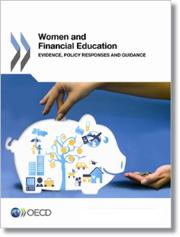Addressing women’s needs for financial education
About
 Both women and men need to be sufficiently financially literate to effectively participate in economic activities and to take appropriate financial decisions for themselves and their families, but women often have less financial knowledge and lower access to formal financial products than men. Women therefore have specific and additional financial literacy needs.
Both women and men need to be sufficiently financially literate to effectively participate in economic activities and to take appropriate financial decisions for themselves and their families, but women often have less financial knowledge and lower access to formal financial products than men. Women therefore have specific and additional financial literacy needs.
This 8-page brochure by OECD INFE looks at barriers to women’s full financial empowerment, the potential contribution improved financial education can make to their financial well-being and makes recommendations for financial education initiatives targeting women and girls.
About OECD INFE
The OECD International Network on Financial Education (INFE) comprises institutions from more than 100 countries to develop policy analysis and guidance on key relevant financial education issues.
In particular, the OECD/INFE is committed to supporting women’s financial empowerment and the related G20 agenda by providing policy evidence, analysis, and guidance to help policy makers address women’s needs for financial awareness and education.
Publication
The publication “Women and Financial Education: Evidence, Policy Responses and Guidance” will be published on 3 October 2013. It provides a comprehensive analysis of the current status of knowledge on gender differences in financial literacy and policy responses in terms of financial education for women and girls. This analysis provided the basis for the policy guidance endorsed by G20 Leaders at the Saint Petersburg Summit meeting on 6 September 2013, entitled Policy Guidance on Addressing Women’s and Girls’ Needs for Financial Awareness and Education.
The need to address the financial literacy of women and girls as a way to improve their financial empowerment, opportunities, and well-being has been acknowledged at the national and international level. At their Summit in June 2012, G20 Leaders recognised the need for women and youth to gain access to financial services and financial education. G20 Leaders have further asked the Global Partnership for Financial Inclusion (GPFI), the OECD International Network on Financial Education (INFE), and the World Bank to identify barriers that women may face and called for a progress report by the 2013 Summit.
Gender Equality in terms of economic and financial opportunities is also at the core of an Organisation for Economic Co-operation and Development horizontal gender initiative that culminated with the approval of the Recommendation of the Council on Gender Equality in Education, Employment and Entrepreneurship in May 2013.Against this backdrop, in 2010 the OECD/INFE developed a workstream to better identify and address the specific needs of women and girls for financial education. This work was carried out within the framework of a broad OECD project on financial education launched in 2002 and with the support of the Russia Trust Fund for Financial Literacy and Education. The OECD/INFE, now comprising 107 countries and 240 public institutions, is the international leader for the development of policy instruments on financial education, policy analysis and research based on cross-country comparable evidence. Drawing on in-depth OECD/INFE membership surveys and evidence, this book presents and develops evidence and policy analysis of gender differences in financial literacy and discusses the factors and barriers related with such gender differences. It then reviews policy responses and initiatives across the world to tackle women’s and girls’ needs and draws lessons from existing experiences.
To access the Executive Summary and first chapter (pdf) and the Policy Guidance on Addressing Women’s and Girls’ Needs for Financial Awareness and Education (pdf), please click here.
See Also
External Links
- Link to the publication (OECD)
- Addressing women’s needs for financial education (OECD, June 2013)
- More information


